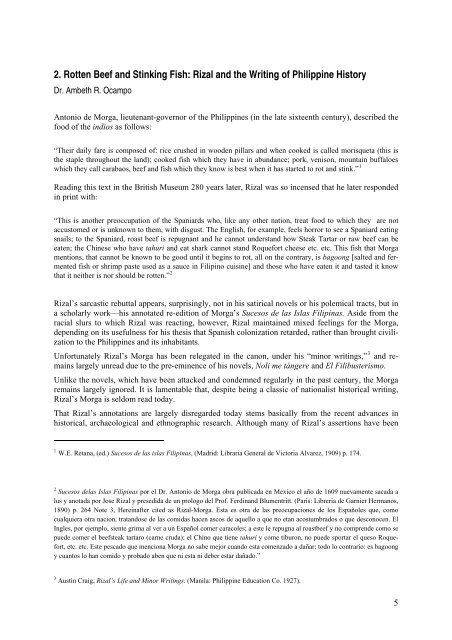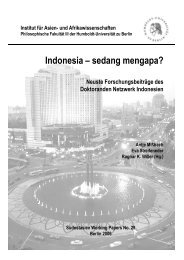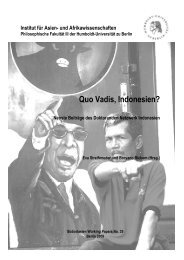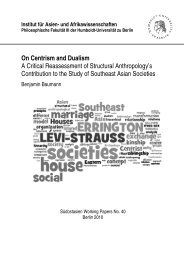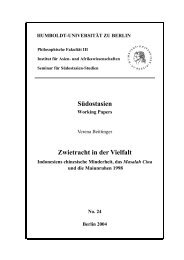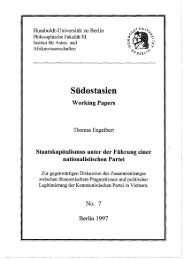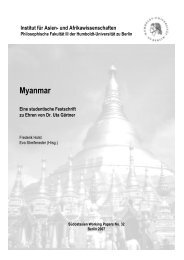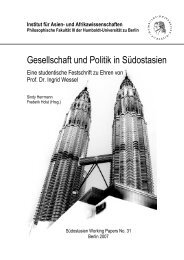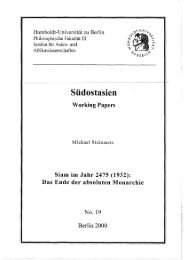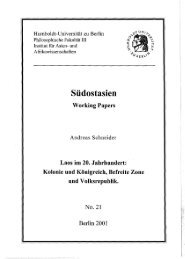Connecting the Philippines and Germany - HU Berlin
Connecting the Philippines and Germany - HU Berlin
Connecting the Philippines and Germany - HU Berlin
Create successful ePaper yourself
Turn your PDF publications into a flip-book with our unique Google optimized e-Paper software.
2. Rotten Beef <strong>and</strong> Stinking Fish: Rizal <strong>and</strong> <strong>the</strong> Writing of Philippine History<br />
Dr. Ambeth R. Ocampo<br />
Antonio de Morga, lieutenant-governor of <strong>the</strong> <strong>Philippines</strong> (in <strong>the</strong> late sixteenth century), described <strong>the</strong><br />
food of <strong>the</strong> indios as follows:<br />
“Their daily fare is composed of: rice crushed in wooden pillars <strong>and</strong> when cooked is called morisqueta (this is<br />
<strong>the</strong> staple throughout <strong>the</strong> l<strong>and</strong>); cooked fish which <strong>the</strong>y have in abundance; pork, venison, mountain buffaloes<br />
which <strong>the</strong>y call carabaos, beef <strong>and</strong> fish which <strong>the</strong>y know is best when it has started to rot <strong>and</strong> stink.” 1<br />
Reading this text in <strong>the</strong> British Museum 280 years later, Rizal was so incensed that he later responded<br />
in print with:<br />
“This is ano<strong>the</strong>r preoccupation of <strong>the</strong> Spaniards who, like any o<strong>the</strong>r nation, treat food to which <strong>the</strong>y are not<br />
accustomed or is unknown to <strong>the</strong>m, with disgust. The English, for example, feels horror to see a Spaniard eating<br />
snails; to <strong>the</strong> Spaniard, roast beef is repugnant <strong>and</strong> he cannot underst<strong>and</strong> how Steak Tartar or raw beef can be<br />
eaten; <strong>the</strong> Chinese who have tahuri <strong>and</strong> eat shark cannot st<strong>and</strong> Roquefort cheese etc. etc. This fish that Morga<br />
mentions, that cannot be known to be good until it begins to rot, all on <strong>the</strong> contrary, is bagoong [salted <strong>and</strong> fermented<br />
fish or shrimp paste used as a sauce in Filipino cuisine] <strong>and</strong> those who have eaten it <strong>and</strong> tasted it know<br />
that it nei<strong>the</strong>r is nor should be rotten.” 2<br />
Rizal’s sarcastic rebuttal appears, surprisingly, not in his satirical novels or his polemical tracts, but in<br />
a scholarly work—his annotated re-edition of Morga’s Sucesos de las Islas Filipinas. Aside from <strong>the</strong><br />
racial slurs to which Rizal was reacting, however, Rizal maintained mixed feelings for <strong>the</strong> Morga,<br />
depending on its usefulness for his <strong>the</strong>sis that Spanish colonization retarded, ra<strong>the</strong>r than brought civilization<br />
to <strong>the</strong> <strong>Philippines</strong> <strong>and</strong> its inhabitants.<br />
Unfortunately Rizal’s Morga has been relegated in <strong>the</strong> canon, under his “minor writings,” 3 <strong>and</strong> remains<br />
largely unread due to <strong>the</strong> pre-eminence of his novels, Noli me tángere <strong>and</strong> El Filibusterismo.<br />
Unlike <strong>the</strong> novels, which have been attacked <strong>and</strong> condemned regularly in <strong>the</strong> past century, <strong>the</strong> Morga<br />
remains largely ignored. It is lamentable that, despite being a classic of nationalist historical writing,<br />
Rizal’s Morga is seldom read today.<br />
That Rizal’s annotations are largely disregarded today stems basically from <strong>the</strong> recent advances in<br />
historical, archaeological <strong>and</strong> ethnographic research. Although many of Rizal’s assertions have been<br />
1 W.E. Retana, (ed.) Sucesos de las islas Filipinas, (Madrid: Libraria General de Victoria Alvarez, 1909) p. 174.<br />
2 Sucesos delas Islas Filipinas por el Dr. Antonio de Morga obra publicada en Mexico el año de 1609 nuevamente sacada a<br />
lus y anotada por Jose Rizal y presedida de un prologo del Prof. Ferdin<strong>and</strong> Blumentritt. (Paris: Libreria de Garnier Hermanos,<br />
1890) p. 264 Note 3, Hereinafter cited as Rizal-Morga. Esta es otra de las preocupaciones de los Españoles que, como<br />
cualquiera otra nacion, trat<strong>and</strong>ose de las comidas hacen ascos de aquello a que no etan acostumbrados o que desconocen. El<br />
Ingles, por ejemplo, siente grima al ver a un Español comer caracoles; a este le repugna al roastbeef y no comprende como se<br />
puede comer el beefsteak tartaro (carne cruda); el Chino que tiene tahuri y come tiburon, no puede sportar el queso Roquefort,<br />
etc. etc. Este pescado que menciona Morga no sabe mejor cu<strong>and</strong>o esta comenzado a dañar; todo lo contrario: es bagoong<br />
y cuantos lo han comido y probado aben que ni esta ni deber estar dañado.”<br />
3 Austin Craig, Rizal’s Life <strong>and</strong> Minor Writings. (Manila: Philippine Education Co. 1927).<br />
5


